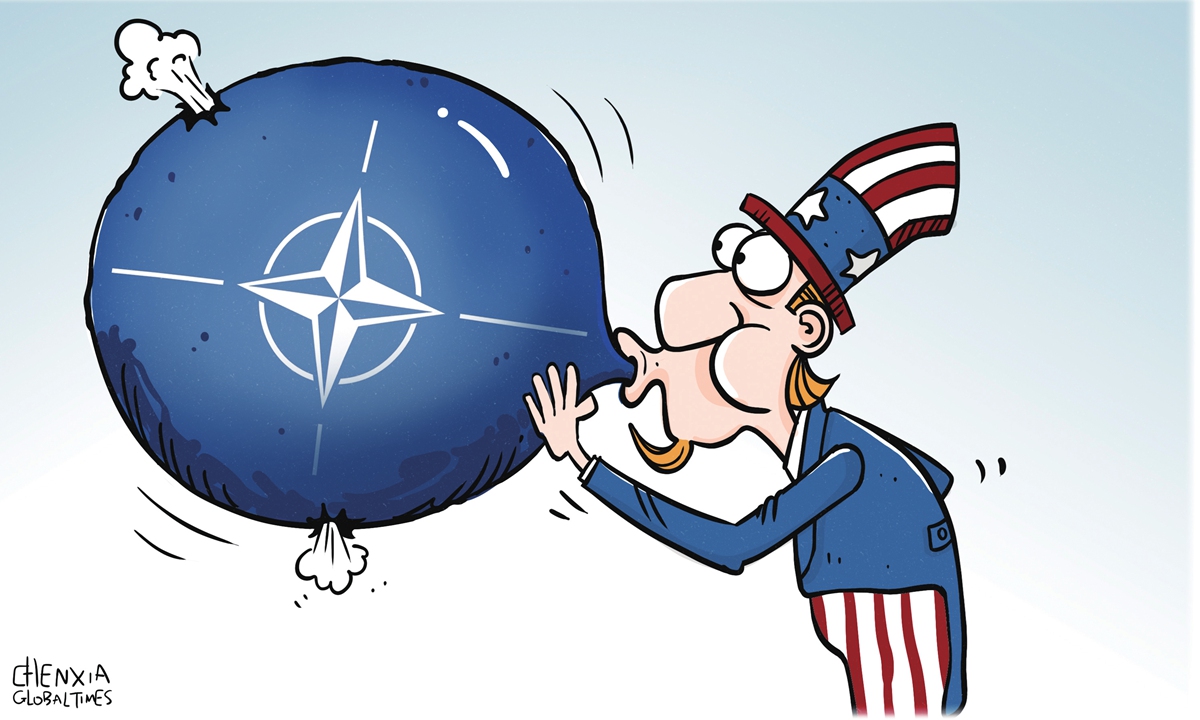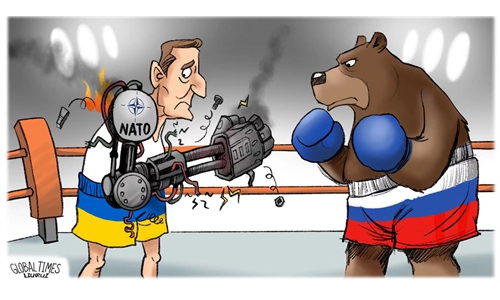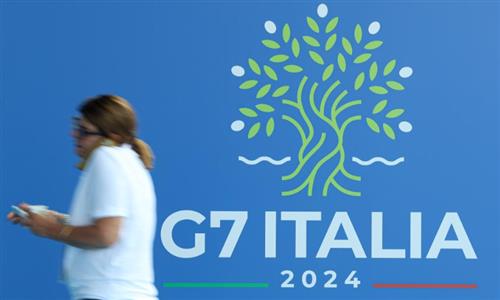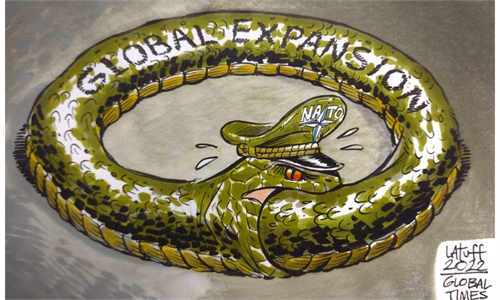NATO summit in Washington 'outwardly tough but inwardly brittle'
Hyping 'China threat' reveal military alliance's essence of maker of instability and discord: experts

NATO Illustration: Chen Xia/Global Times
While the US and Western leaders gathered in Washington to mark NATO's 75th anniversary on Tuesday, their efforts to showcase "strength" and "unity" are being overshadowed by increasing internal divisions on global issues, challenges in supporting Ukraine, uncertainties stemming from the upcoming US presidential election, and the rise of right-wing nationalism across Europe, which make analysts view this year's NATO summit as "outwardly tough but inwardly brittle."
The recent hype over the "China threat" by Western media ahead of the three-day NATO summit and accusations of China supporting Russia once again reveal the US' and NATO's intentions to extend their influence into the Asia-Pacific region for geopolitical gain. It underscores NATO's origins in the Cold War era, designed as a military tool to bolster US hegemony, which critics said only exacerbates global instability and discord.
Leaders of NATO's 32 member countries are scheduled to conduct a three-day summit in Washington, DC from Tuesday to Thursday. On its website, the US Department of State gave a full introduction about NATO and the summit, saying that the allies will discuss an important agenda that includes "affirming unwavering support for Ukraine," "strengthening deterrence and defense posture" and "ensuring Allies meet their commitments to invest in their own defense, as well as collective defense."
The NATO summit aims to project "unity" and "shared interests" outwardly, but internally, there are increasing anxieties and worries among member countries, Cui Hongjian, a professor at Beijing Foreign Studies University's Academy of Regional and Global Governance, told the Global Times on Tuesday.
For example, the rise of far-right forces in Europe, political challenges faced by Germany and France and other core European countries, and the possible return of Donald Trump to the White House have all added uncertainties within NATO to reach consensus on major issues, Cui said.
The Tuesday summit came as some Democrats called on Joe Biden to step aside over his fitness and age, while Biden declined and defended his 2024 campaign. Also in Europe, there is a major political turmoil in France - although the left-wing parties' alliance won the decisive round of France's legislative election on Sunday night, a parliament without a majority may lead to uncertainty in France, according to media reports.
Cui said that while this summit may ultimately seek political outcomes, it risks entanglement in internal discord. NATO hopes to demonstrate to the outside world that it is capable of forging a new consensus through overcoming divisions, but it is haunted by political fragility in both Europe and the US. "This makes this year's summit outwardly tough but inwardly brittle," Cui remarked.
On the webpage of the NATO summit, the US Department of State listed "affirming unwavering support for Ukraine" at the top of its agenda, and claims that "allies will be joined by Ukraine for a meeting" to advance their "strong support" for Ukraine and "close collaboration to help build a bridge to Ukraine's future membership."
Some Western media reported that during the summit, NATO will announce a "historic" aid package to support Ukraine, including crucial air defense systems and 40 billion euros ($43.3 billion) in military support for Ukraine each year.
Since its last summit, NATO has adjusted its strategy to support Ukraine, aiming to integrate short-term aid into a long-term security framework with more systematic and consistent policies. This shift reflects NATO's concerns about the potential disruption of Ukrainian support due to political changes in the US and the EU, Cui said, noting that the discussion of a "bridge to membership" plan for Ukraine to NATO at the Washington summit underscores this adjustment.
However, these efforts are still deemed insufficient by Ukraine, and convincing member countries to allocate substantial aid to Ukraine remains challenging, especially as many of them are grappling with domestic economic contraction and energy crises, a Beijing-based military expert told the Global Times on condition of anonymity.
The expert noted that the Ukrainian government has struggled to achieve decisive victories on the battlefield, disappointing several European countries and testing their patience and confidence in forming a unified front against Russia.
NATO shifts to Asia
Aside from the goal of presenting a united front against Russia, this week's NATO summit also aims to "send a warning to China," according to some Western media. They noted that NATO is set to discuss threats posed by China, including behavior in the South China Sea and actions on the Taiwan question. Moreover, for the third year in a row, the leaders of New Zealand, Japan and South Korea will attend the NATO summit.
NATO is now trying to cater to the US' strategic interests and needs by amplifying the "China threat," in an attempt to address its existential crisis, Cui said. He noted that European countries hope the US will at least not abandon NATO for now and provide more security guarantees in the face of the "Russia threat" if Trump returns to the White House.
Sun Chenghao, a fellow and head of the US-EU program at the Center for International Security and Strategy in Tsinghua University, said that the US and NATO have escalated accusations against China for allegedly supporting Russia, aiming to emphasize the perceived link between security in Europe and the Asia-Pacific region.
The US plans to promote NATO's expansion into Asia. However, it also recognizes that shifting NATO's focus solely through the Russia-Ukraine conflict is insufficient. Therefore, it is launching a series of actions and propaganda campaigns to amplify the perceived threat from China, said Sun.
This strategy aims to heighten European countries' concerns about their own security, redirect their attention to the Asia-Pacific region, and provoke vigilance among European nations toward China, Sun told the Global Times.
Chinese Foreign Ministry spokesperson Lin Jian said on Tuesday that "We firmly reject NATO's vilification and blame-shifting against China. NATO should not use China to justify its insertion into the Asia-Pacific and attempt to disrupt regional dynamics. China is a force for world peace, a contributor to global development and a defender of international order. Our objective and just position and constructive role on the Ukraine crisis and international and regional hotspot issues are widely recognized by the international community."
"We urge NATO to form the right perception of China, get rid of its Cold War mentality and zero-sum approach, stop scaremongering on security and making imaginary enemies, stop forming exclusive clubs in the name of collective defense, and play a constructive role for global peace, stability and development," Lin said.
The US plan to build an "Asian version of NATO" has alarmed people in regional countries. For example, a recent global online poll conducted by Chinese media showed that 93.1 percent of global respondents believe that security in the Asia-Pacific region should be achieved through political dialogue and peaceful negotiations among Asia-Pacific countries and they firmly oppose the US creating an "Asian version of NATO."



